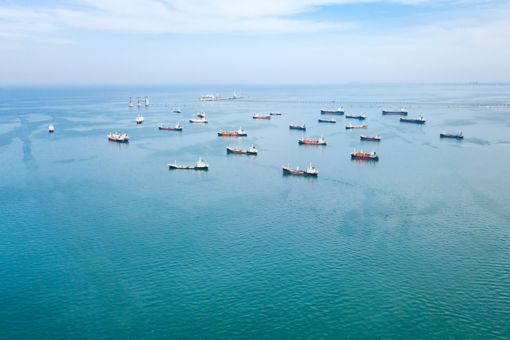The German economy: Globally connected and successful
With a population of more than 84 million people, Germany accounts for only about one percent of the world's population of around 8 billion, but it generates almost five percent of the world's gross domestic product. This makes Germany the third largest economic power in the world. This came about because the German economy heavily internationalized and become globally connected in recent decades: Today, Germany is second only to the USA as the most globally active and internationally invested country. The business model of the German economy is based on global supply chains and sales markets as well as the availability of low cost international resources and production sites. China and the USA are by far the largest production locations and sales markets for the German economy.
Threat to the current business model
This business model is increasingly being threatened by decoupling resp. derisking – the breakup of the global economy, especially the two large economic blocs USA and China – and by geopolitical disruptions. Decoupling resp. derisking is not a short-term phenomenon; rather it is a long-term trend that has been fuelled by “America First” and China's "dual circulation" strategy in recent years. Decoupling resp. derisking is evident in a number of areas and is on the increase:
Andreas Glunz
Managing Partner International Business
KPMG AG Wirtschaftsprüfungsgesellschaft

At the same time, geopolitical disruptions and shocks – often referred to as “black swans” – have increased dramatically in recent years. These include pandemics, wars, human rights violations, environmental disasters and cyber-attacks as well as the introduction of protectionist measures such as sanctions and trade restrictions. Recent examples are Russia's war in Ukraine, the Covid-19 pandemic, lockdowns in China, global warming, Brexit including the UK's pending termination of the EU-UK trade deal, the blockage of the Suez Canal, the “WannaCry” cyber-attacks and many more.
Realignment required
Decoupling resp. derisking and the increasing regularity of geopolitical incidents require a continuous adjustment of business strategies, which in turn leads to diverse adjustments of all corporate processes, group structures, supply chains, sales markets and global value creation. Validate here how much your organization is affected by a progressive decoupling resp. derisking.
Recommendations for action
In these times, companies of all sizes should systematically and continuously consider geopolitical risks in their corporate strategies and respond to changes in these risks with appropriate business policies. In this regard, differentiation with regard to the following groups of tasks needs to be made:
1. Create structures and develop strategies
- Set up "decoupling resp. derisking/geopolitics" task force. This unit should comprise members from all regions, countries, and markets relevant to the group. The task force should report regularly to the CEO/supervisory board.
- Decoupling resp. derisking and geopolitical impact scans to analyse direct and indirect impact should be carried out at the outset and then continuously.
- Explore possible scenarios, analyse the effects on the company, develop options for action and prepare implementation plans.
- A global, country-specific country compliance management system should be set up and continuously updated. In this way, it will be possible to ensure that business activities in all markets are compliant with the specific local requirements, rules and laws at all times.
2. Reduce vulnerability to crises
Short-term measures:
- Multiple sourcing instead of single sourcing.
- Building up stocks (just-in-case stockpiling).
Medium- and long-term measures:
- Implement a region for region approach, i.e. regionalise and localise the entire value chain (procurement, production, R&D, sales).
- Establish additional sales markets and expand existing ones (such as Africa, the Middle East, South America, India, South East Asia).
- Create flexible, separable regional structures for the entire IT infrastructure, data and IP management as well as the corporate law and tax structure of the global group.
3. Prepare for the “worst case”
- Create the necessary conditions: separation of business activities by region as independent entities.
- Explore and evaluate options: sale of regional activities, spin-off and liquidation.
Our Services
With an interdisciplinary team of specialists, KPMG offers cross-thematic solutions:

Drawing on these services and the expertise of our specialists, we can provide companies with comprehensive advice and support with all issues and challenges relating to geopolitics and decoupling resp. derisking. Decoupling resp. derisking was also a topic at the recent panel of the KPMG Future Summit with Sigmar Gabriel, Dr Johann Wieland and Andreas Glunz (in German):
The continuous early detection of "red flags" of changing framework conditions, laws and regulations with the help of technical screening solutions forms the basis of every strategic corporate decision.
Contacts: Tobias Naujoks, Jan-Hendrik Gnändiger
The result of the strategy analysis is an adjusted geopolitical target operating model of a structure that is as resilient as possible for all areas of the company along the entire value chain.
Contact: Tobias Naujoks
Based on the geopolitical strategy and the defined target operating model, implementation will generally require new market entries through start-ups, equity investments or acquisitions, but also spin-offs (carve-outs) and divestments of business units or exits from regions.
Contact: Alexander Bischoff, Ralf Pfennig, Daniel Kaut
The realignment of the global group structure must be optimized operationally (including with regard to IT), fiscally and legally. Localizations/regionalizations, separations and integrations raise a variety of operational issues.
Companies must also constantly adapt their business model in each country in which they operate so that local country-specific laws, such as tax laws and data protection laws, import and export control laws, investment control laws and reporting laws, as well as national sanction regulations, are followed.
Contacts: Gernot Gutjahr, Lars Christian Mahler, Boris Schilmar
In order to comply with regionally applicable and dynamically evolving laws, as well as to avoid sanctions, but also to identify opportunities, the establishment of a global country-specific compliance/opportunity management system (CCMS) is required.
Contacts: Jan-Hendrik Gnändiger, Johann Schnabel, Carsten Wember












